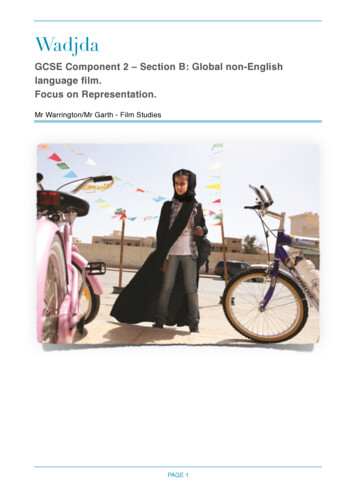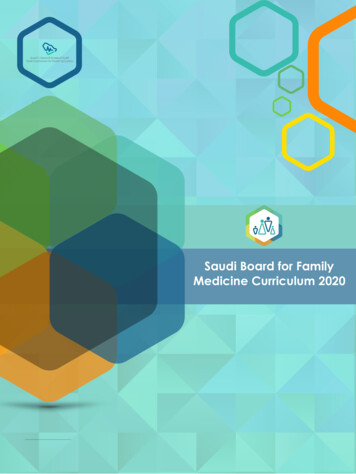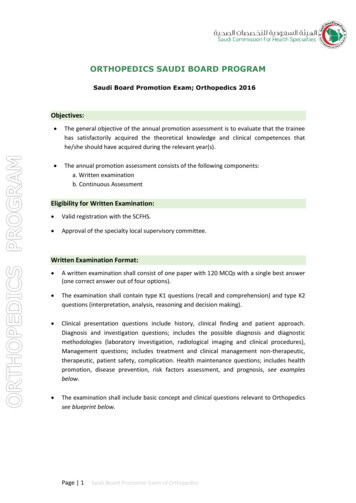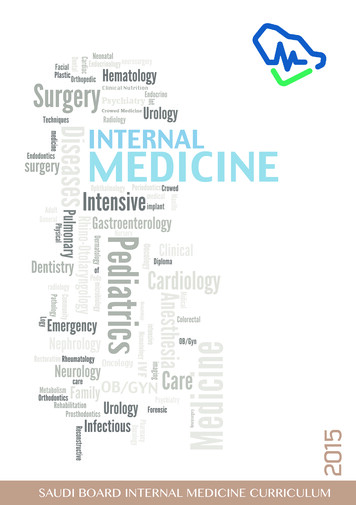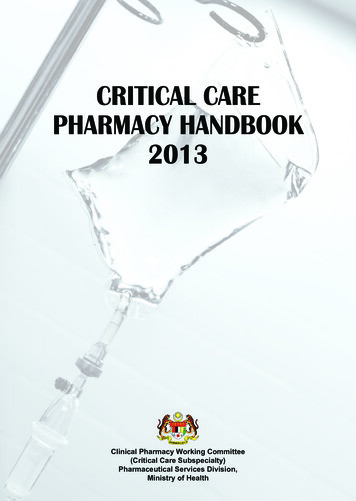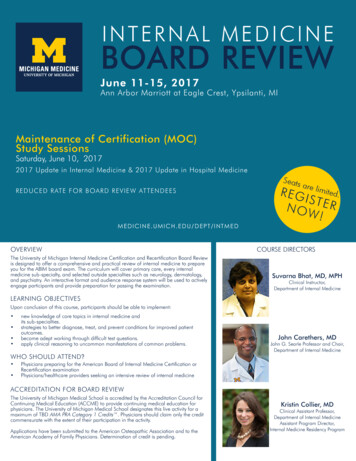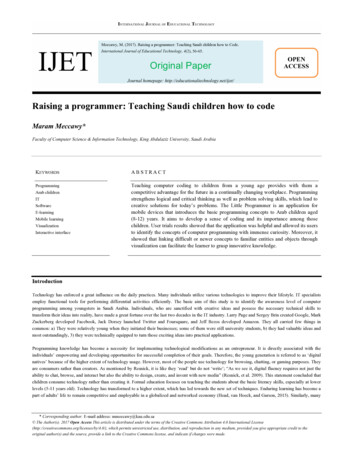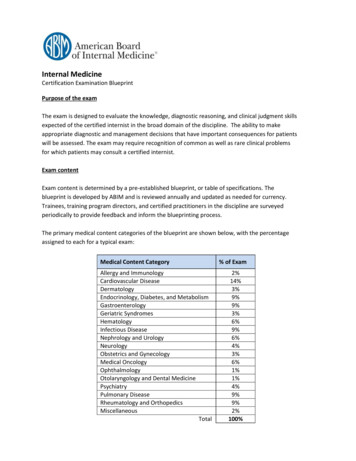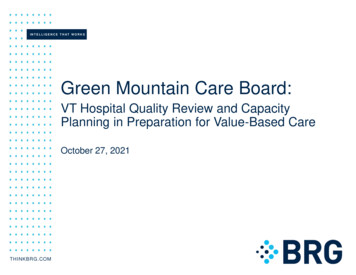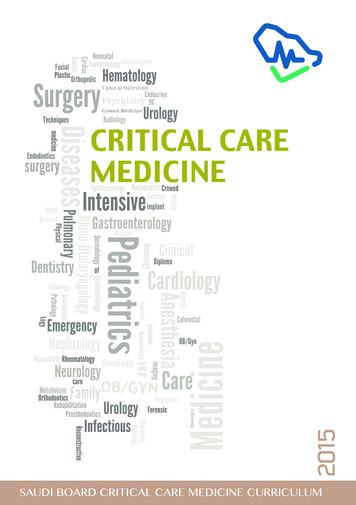
Transcription
SAUDI BOARDCritical Care Medicine Curriculum2015PreparationCurriculum Scientific GroupDr. Yasser MandourahDr. Amin YousefDr. Khalid MaghrabiDr. Haifa M. AlgethamySupervisionCurriculum SpecialistProf. Zubair AminDr. Sami AlshammariReviewed and ApprovedScientific CommitteeDr. Walid AlyafiDr. Yasser MandourahDr. Abudlaziz AlzairDr. Awaad AlammeriDr. Kalid MagrabiDr. Ayman KarabahDr. Haifa AlgthamiDr. Abdulazia AldawoodDr. Mohammad AlbraakSAUDI BOARD CRITICAL CARE MEDICINE CURRICULUM1
COPYRIGHT AND AMENDMENTS 2015 Saudi Commission for Health Specialties. All rights reserved.This material may not be reproduced, displayed, modified, or distributed without writtenpermission from the copyright holder. No other use is permitted without prior writtenpermission from the Saudi Commission for Health Specialties. For permission, contact theSaudi Commission for Health Specialties, Riyadh, Kingdom of Saudi Arabia.Any amendment to this document must be approved by the Specialty Scientific Counciland the Executive Council of the Commission. Amendments shall be considered effectivefrom the date on which the revised electronic version is published on the commission’swebsite, unless a different implementation date has been agreed upon.Correspondence:Saudi Commission for Health SpecialtiesP.O. Box: 94656Postal Code: 11614Contact Center: 920019393E-mail: systemadmin@scfhs.orgWebsite: www.scfhs.org.saFormatted and Designed by:Manoj Thomas Varghese, CMT (SCFHS)2SAUDI BOARD CRITICAL CARE MEDICINE CURRICULUM
Table of ContentsSAUDI BOARD 1ACKNOWLEDGEMENTS 7INTRODUCTION 9Mission Statement 9PROGRAM STRUCTURE 11Admission Requirements 11General Training Requirements 11Structure of the Training Program 11General Framework of Required Rotations 12strdRequired rotations for the junior residency period (1 to 3 year) 12ththRequired rotations for the senior residency period (4 and 5 year) 14Institutions 15Affiliation Agreements 15Participating Institutions 16Facilities and Resources 16Personnel 17Program Director 17Responsibilities and Requirements of the Program Director 18Program Faculty 18Core Faculty Development 19Other Program Personnel 19Educational Program 20Organization and Structure 20Number of Residents 21Presence of Other Residencies and Other Educational Resources 21Extracurricular Activities 22TRAINING RULES AND REGULATIONS 24Evaluation 24Evaluation of Residents 24Remediation Process 24Evaluation of Faculty 26SAUDI BOARD CRITICAL CARE MEDICINE CURRICULUM3
Program Evaluation 27Others 37Vacation & Conference Leave 37Notice of Changes in the Program 37ROTATION OBJECTIVES 39General Critical Care Rotation 39Required Domains 42Senior Critical Care Medicine Rotation 50Coronary Care Unit Rotation 54Cardiac Surgery ICU Rotation 56General Surgery Rotation 59Core Anesthesia Rotation 61Emergency Medicine Rotation 65Trauma Rotation 68Thoracic Surgery Rotation 69Vascular Surgery Rotation 72Regional Anesthesia (Elective) 74Pain Medicine 78Neuroanesthesia 81Cardiac Anesthesia 83Critical Care Radiology Rotation 87Critical Care Echocardiography Rotation 89Research Rotation 91Core Internal Medicine Rotation 92A: Rotation in Pulmonary Medicine 92B. Rotation in Nephrology 94C: Rotation in Hematology and Oncology 97D: Rotation in Infectious Disease 99E: Rotation in Gastroenterology 101Elective Rotation 104Mandatory Workshops and Courses 105Logbook 1064SAUDI BOARD CRITICAL CARE MEDICINE CURRICULUM
Portfolio 107Rotation Schedule 108UNIVERSAL TOPICS 110Intent 110Module 1 - General Hemodynamic Monitoring 110Module 2 - Acute Care 111Module 3 - Airway Management 112Module 4 - Medical and Surgical Emergencies 113Module 5 - Ethics and Healthcare 113Module 6 - Topics that Residents Will Encounter in Hospital Practice 115Module 7 - Bedside Ultrasound for Assessment of Critically Ill Patients 116ASSESSMENT 119Annual Assessment 119Continuous Appraisal 119Formative Continuous Evaluation 119Summative Continuous Evaluation 120End-of-Year Examination 120Principles of Critical Care Medicine Examination (Saudi Board Examination: Part I)120Final In-training Evaluation Report (FITER)/Comprehensive Competency Report (CCR)121Final Critical Care Medicine Board Examination (Saudi Board Examination: Part II)121Written Examination 121Clinical Examination 121Certification 121PROGRAM SUMMARY AND COMPETENCIES 123Critical Care Medicine Program 123Overall Program CanMEDS Competencies 125List of Serious Conditions 143List of Essential Procedures 148Core Teaching Topics 150SAUDI BOARD CRITICAL CARE MEDICINE CURRICULUM5
6SAUDI BOARD CRITICAL CARE MEDICINE CURRICULUM
ACKNOWLEDGEMENTSThe critical care medicine core curriculum team appreciates the valuable contributionsand feedback from all members of the supervisory committee during the construction ofthis manual: This work could not have been accomplished without their support. Wewould also like to acknowledge that the CanMEDS framework is a copyright of the RoyalCollege of Physicians and Surgeons of Canada, and many of the descriptions and criticalcare medicine competencies have been acquired from their resources. Special thanks andappreciation to Dr. Adel Bassily-Marcus, Dr. Stephen M. Pastores, Dr. Philip S. Barie, andDr. Gregory Botz for the great support and contribution in the preparation of thisprogram.SAUDI BOARD CRITICAL CARE MEDICINE CURRICULUM7
INTRODUCTIONIntroduction8ACKNOWLEDGEMENTS CRITICAL CARE MEDICINE CURRICULUM
INTRODUCTIONThe Critical Care Residency Program is a unique structural postgraduate training programthat will help fulfill the current critical national need for trained physicians in this field.This program is designed to prepare physicians for practicing competently andindependently in Critical Care Medicine. Specifically, using the CanMEDS framework, itteaches the fundamental skills, knowledge, and humanistic qualities inherent to CriticalCare Medicine practice and provides progressive responsibility for and experience in theapplication of these principles to enable effective management of clinical problems.Equal opportunity must be provided to Residents, under the guidance and supervision ofqualified faculty, to develop a satisfactory level of clinical maturity, judgment, andtechnical skill. Upon completion of this program, Residents should be capable of practicingCritical Care Medicine, learning new skills and knowledge during their careers, andmonitoring both their own physical and mental well-being and that of others.Mission Statement To set the educational standards for training and certification in the field of adultCritical Care Medicine.To evaluate and accredit training centers in adult Critical Care Medicine.SAUDI BOARD CRITICAL CARE MEDICINE CURRICULUM9
PROGRAM STRUCTUREProgram Structure10INTRODUCTION CRITICAL CARE MEDICINE CURRICULUM
PROGRAM STRUCTUREPROGRAM STRUCTUREAdmission RequirementsIn accordance with and without contradiction to the SCFHS training rules and regulations,the following requirements must be fulfilled by any candidate accepted into the trainingprogram:1.2.3.4.5.6.7.All candidates must hold a medical degree such as an M.B.B.S. or its equivalent froma university recognized by the commission.All candidates must have completed a 12-month rotating internship.All candidates must have passed the Saudi Medical Licensing Exam (SMLE).All candidates must provide a comprehensive CV with references from two (2)consultants, preferably from the field of critical care medicine, who should providerecommendation letters stating the suitability of the candidate for training in criticalcare medicine.All candidates must provide a letter from a sponsoring organization, approving andpledging support for the candidate’s total period of training, i.e., 5 years, and forsponsored positions.All candidates must be registered as training critical care medicine at the SaudiCommission for Health Specialties (SCHS).All candidates must have basic life support certification and malpractice insurance.General Training Requirements1.2.3.4.5.Trainees shall abide by the training regulations and obligations set by the SCFHS.Training is a full-time commitment. Residents will be enrolled in full-time, continuoustraining for the program’s duration.Training is to be conducted in institutions accredited for training by the Saudi Boardof Critical Care Medicine.The training will comprehensively cover the specialties related to Critical CareMedicine.Trainees should be actively involved in patient care with gradual progression ofresponsibility.Structure of the Training Program1.2.3.This is a 5-year (60-month) postgraduate structured training program in Critical CareMedicine and is divided into two parts: junior residency (the first 3 years) and seniorresidency (the last 2 years).The junior residency period (R1, R2, and R3) is designed to provide training in CriticalCare Medicine practice and provides rotations in selected specialties important forCritical Care Medicine practice.The senior residency period (R4 and R5), which begins after the Resident passes thePart 1 exam, is designed to give the Resident a chance to gain progressiveresponsibility in functioning as a junior Critical Care Medicine staff member undersupervision. In the fifth year, the Resident is expected to conduct Critical CareMedicine rounds and make decisions regarding patient management.SAUDI BOARD CRITICAL CARE MEDICINE CURRICULUM11
PROGRAM STRUCTURE4.5.6.7.Residents are required to satisfactorily complete the allocated rotations for eachyear and pass the end-of-year evaluation exam before proceeding from one year tothe next.The sequence of rotations will be determined by the regional training committee.After successfully completing all 5 years of training and obtaining the Final InTraining Evaluation Report (FITER) as well as achieving the designated passing markon the End-of-Year Promotion Exam, candidates will receive a Training CompletionCertificate issued by the training center’s regional committee. The candidate willthen be eligible to sit the Final Certification Examination of the Saudi Commission ofCritical Care Medicine.Successful candidates in the Final Certification Examination will receive the SaudiCommission Specialty Certification in Critical Care Medicine.General Framework of Required RotationsRequired rotations for the junior residency period (1st to 3rd year) Each rotation will be 4–12 weeks The exact sequence of rotations shall be designated by each regional residencyprogram committee. It should be noted that every Resident must complete 24 weeks in general CriticalCare Medicine during the first year of training. Residents are required to perform on-call duties every rotation, including off-servicerotations, where they are required to take 1 of every 4 critical care calls. Residents are expected to perform 4–7 on-call duties per month. Annual leave follows the SCFHS rules and regulations (4 weeks 1 public holiday 1academic week with approval of the program coordinator) and is provided eachyear. Residents are not recommended to take more than 2 weeks of leave during anygiven rotation.rdthth Four weeks of elective rotation will be offered during the 3 , 4 , and 5 years oftraining in the administration/quality improvement, educational, or clinical fields.Electives must be approved by the program director. The following criteria will beused to guide the program director in determining whether an elective is consideredacceptable:1.Electives must meet the defined learning objectives for the practice of adultCritical Care Medicine.2.A supervisor must be identified.3.Residents must be properly evaluated during their electives.4.Electives should be performed at hospitals accredited by the SCFHS, with thefollowing exceptions and conditions:a.The elective is not offered in Saudi Arabia.b. The elective is offered in another center that will allow the Resident todevelop expertise in Critical Care Medicine that could not otherwise beattained in Saudi Arabia.12SAUDI BOARD CRITICAL CARE MEDICINE CURRICULUM
PROGRAM STRUCTURENo.RotationNameTotal Duration inweeksGeneral Principle and Remarks1General ICU64Exposes Residents to medical surgicalCritical Care Medicine and includes a 4weeks’ rotation in the maternity andneuro ICUs2Coronary Care8Residents are assigned to a centerproviding adequate exposure tocommon cardiac emergencies3CardiacSurgery ICU8Residents are assigned to a centerthat performs various cardiacsurgeries and utilizes hemodynamicinvasive monitoring and support4EmergencyMedicine8Resident are exposed to commonmedical and surgical emergencies5Anesthesia8Residents eResidents are exposed to commonsurgical problems in general surgery (8weeks)Residents are assigned to a centerwith a reasonable volume of commontrauma casesResidents are exposed to variousaspects of medical care in:General medicine (8 weeks)8Medicine32Pulmonary medicine (8 weeks)Nephrology (8 weeks)Infectious diseases (8 weeks)SAUDI BOARD CRITICAL CARE MEDICINE CURRICULUM13
PROGRAM STRUCTURERequired rotations for the senior residency period (4th and 5th year) Each rotation will be 4–12 weeks. The exact sequence of rotations shall be designated by each regional residencyprogram committee. Residents are required to perform on-call duties every rotation, including off-servicerotations, where they are required to do 1 in 4 critical care on-calls. Residents are expected to perform 4–7 on-call duties per month. Annual leave follows the SCFHS rules and regulations (4 weeks 1 public holiday 1academic week with the approval of the program coordinator) and is provided eachyear. Residents are not recommended to take more than 2 weeks of leave during anygiven rotation.rdthth Four weeks of elective rotation will be offered during the 3 , 4 , and 5 years oftraining in the administration/quality improvement, educational, or clinical fields.Electives must be approved by the program director. The following criteria will beused to guide the program director in determining whether an elective is consideredacceptable:5.Electives must meet the defined learning objectives for the practice of adultCritical Care Medicine.6.A supervisor must be identified.7.Residents must be properly evaluated during their electives.8.Electives should be performed at hospitals accredited by the SCFHS, with thefollowing exceptions and conditions:c.The elective is not offered in Saudi Arabia.d. The elective is offered that will allow the Resident to develop expertise inCritical Care Medicine that could not otherwise be attained in SaudiArabia.14SAUDI BOARD CRITICAL CARE MEDICINE CURRICULUM
PROGRAM STRUCTURENo.Rotation NameTotal Durationin weeksGeneral Principle and Remarks1General ICU40Exposes Resident to medical surgicalCritical Care Medicine in addition to 4weeks’ rotation in a burn ICURegional (4 weeks)Cardiac (4 weeks)2Anesthesia16Neuro (4 weeks)Pain control (4 weeks)Residents are exposed to commonsurgical problems in3Surgery12Thoracic Surgery (8 weeks)Vascular Surgery (4 weeks)Residents are introduced to researchmethodologies and learn how towrite a proposal and perform a shortterm study.Residents learn to interpret adiology4Residents are learn how to readradiological tests commonly used inCritical Care Medicine.7Elective12Residents are given a chance to workin an area of interest or need.InstitutionsThe institution(s) involved in the program must provide evidence of their commitment tograduate medical education, including Critical Care Medicine. While it is recognized thatthe practice of Critical Care Medicine occurs within a variety of organizational structures,the administrative and academic structure of the institution must be organized in such away that it facilitates the provision of an adequate educational experience.Affiliation AgreementsWhen there is a cooperative educational effort involving multiple institutions, thecommitment of each institution to the program must be made explicit in an affiliationagreement that conforms to the standards of the SCFHS.In addition, there must be a current letter of understanding between the Program Directorand the individual responsible for each Resident rotation in the program that describesthe educational objectives and the means by which they will be accomplished andSAUDI BOARD CRITICAL CARE MEDICINE CURRICULUM15
PROGRAM STRUCTUREevaluated; the resources and facilities in the institution(s) that will be available toResident, such as the library and medical records; the Resident’s dutiesresponsibilities for each rotation; the relationship that will exist between CriticalMedicine Residents and faculty in other programs; and the supervision CriticalMedicine Residents will receive for each rotation.eachandCareCareFor Critical Care Medicine rotations, the physician responsible for the teaching andsupervision of Critical Care Medicine Residents (under the authority of the ProgramDirector) must be identified.Participating InstitutionsThe program should be based at a primary hospital (hereafter referred to as the “primaryclinical site”). The majority of the didactic and clinical experiences should take place at theprimary clinical site. Educationally justified exceptions to this requirement will beconsidered.Each affiliated institution must offer significant educational opportunities to the overallprogram. The reasons for including each institution must be stated. Affiliations that simplyduplicate experiences already available within the program are not desirable.Any hospital to be considered for training must meet the following requirements:1. The intensive care unit (ICU) has a minimum of twenty (20) beds with a minimum oftwo isolation beds and a ratio of 1 consultant for every 10 beds.2. The hospital provides multidisciplinary services including the following at aconsultant level: Pulmonary Cardiology/coronary care unit (CCU) Nephrology Infectious disease Neurology/neurosurgery General surgery/urology/orthopedic Obstetric/gynecology3. The minimum annual patient admission to the ICU is 300 patients.4. The ICU must provide Level 1 patient care in mechanical ventilation and noninvasiveand invasive hemodynamic monitoring.5. A suitable (1:1 or 1:1.5) nurse-to-patient ratio must be maintained.6. Dedicated medical staff must be available 24 hours per day, 7 days per week toprovide necessary patient care.7. The ICU must adopt a closed or concurrent care system.8. The ICU must have a dedicated director who will ensure the development andapplication of relevant medical policies and who may serve as the Program Directorif he/she has the suitable qualifications.Facilities and ResourcesIn every hospital in which the Critical Care Medicine department is used as a training site,the following must be provided:1. Adequate space for patient care.16SAUDI BOARD CRITICAL CARE MEDICINE CURRICULUM
PROGRAM STRUCTURE2.3.4.5.6.7.Adequate space for clinical support services.Timely return of laboratory and diagnostic imaging results, especially those requiredon a STAT basis.Adequate program support space, including office space for faculty and Residents.Up-to-date medical library resources, including access to appropriate informationalresources and medical databases in the Critical Care Medicine department. Inaddition, Residents must have ready access to a major medical library either at theinstitution where they are located or through arrangements with nearby institutions.Services available should include the electronic retrieval of information from medicaldatabases.An adequate and readily accessible instructional space.On-call facility (beds/bath).PersonnelThe program leadership and faculty are responsible for the general administration of theprogram, including those activities related to the recruitment, selection, instruction,supervision, counseling, evaluation, and advancement of Residents and the maintenanceof records related to program accreditation.Specific responsibilities are defined below. Frequent changes in leadership or long periodsof temporary leadership may adversely affect the accreditation status of the program.Program DirectorThere must be a single Program Director who is responsible for the program. The ProgramDirector must function within a sound administrative organizational framework and havean effective program faculty in order for the residency program to be approved. TheProgram Director must be a member of the program's core teaching faculty. The ProgramDirector must:1. Be licensed to practice medicine in Saudi Arabia, where the institution that sponsorsthe program is located;2. Be qualified and have at least 3 years of experience as a clinician, administrator, andeducator in Critical Care Medicine;3. Be certified in Critical Care Medicine by the American, Canadian or Saudi Board ofMedical Specialties (recognized) or have appropriate educational qualifications inCritical Care Medicine;4. Be active in the field of Critical Care Medicine, be clinically active, devote sufficienttime and effort to the program to provide day-to-day continuity of leadership, andfulfill all of the responsibilities inherent to meeting the educational goals of theprogram;5. Maintain his/her appointment in good standing, including clinical privileges, andprovide clinical supervision at the primary clinical site; he/she should also be basedat the primary clinical site;6. Demonstrate leadership qualities and the capability to mentor Critical Care MedicineResidents;7. Demonstrate active involvement in:a) Critical Care Medicine continuing educationSAUDI BOARD CRITICAL CARE MEDICINE CURRICULUM17
PROGRAM STRUCTURE8.9.b) Regional or national scientific societiesc)Presentations, publications, and other scholarly activitiesHave at least 25% of his/her time protected from clinical service; andHave appropriate authority to oversee and organize the activities of the educationalprogram, including but not limited to:a) Resident appointments and assignmentsb) Supervision, direction, and administration of the educational activitiesc)Evaluation of the Residents, faculty, and residency programResponsibilities and Requirements of the Program DirectorProgram directors must prepare a written statement outlining the educational goals of theprogram with respect to knowledge, skills, and other attributes of Residents at each levelof training and for each major rotation or other program assignment. This statement mustbe distributed to Residents and members of the program faculty. It should be readilyavailable for review.1. Selection of Residents for appointment to the program in accordance withinstitutional and departmental policies and procedures.2. Participation in the evaluation of the program faculty and other program personnelat each institution participating in the program.3. The supervision of Residents through explicit written descriptions of supervisorylines of responsibility for patient care. Such guidelines must be communicated to allprogram staff members. Residents must be provided with prompt and reliablemeans of communication and interaction with supervisory physicians.4. Regular evaluation of Residents' knowledge, skills, and overall performance based onthe competency standards listed in this document.5. Provision of a written final evaluation for each Resident who completes the program.The evaluation must include a review of the Resident's performance during the finalperiod of training and should verify that the Resident has demonstrated sufficientprofessional ability to practice competently and independently. This final evaluationshould be part of the Resident's permanent record maintained by the institution.6. Implementation of fair procedures devised by the sponsoring institution regardingacademic discipline and Resident complaints or grievances.7. Monitoring Resident stress, including mental or emotional conditions that inhibitperformance or learning. Program directors and faculty should be sensitive toResidents’ need for timely confidential counseling and psychological supportservices. Training situations that consistently produce undesirable stress in Residentsmust be evaluated and modified.8. Preparation of an accurate statistical and narrative description of the program asrequested by a review committee.Program FacultyThere must be a sufficient number of program faculty (at least 1 consultant for every 10beds) with documented qualifications to adequately instruct and supervise all programResidents. Members of the program faculty must be able to devote sufficient time to meettheir supervisory and teaching responsibilities. To ensure a sufficient number of facultymembers for provision of adequate on-line 24-hour supervision of Critical Care Medicine18SAUDI BOARD CRITICAL CARE MEDICINE CURRICULUM
PROGRAM STRUCTUREdepartment attending staff and participation in ongoing scholarly activity and research insupport of the Critical Care Medicine Residents, there must be a minimum of 1 corephysician faculty member for every Resident in the program.1. A core physician faculty member is a member of the program faculty who providesclinical services and teaching, devotes the majority of his/her professional efforts tothe program, and has sufficient time outside of direct service responsibilities to meetthe educational requirements of the program. The majority of the core faculty must:a) Be certified by the American, Canadian, or Saudi Board of Medical Specialties(recognized)b) Show evidence of participation in a range of professional activities within theinstitution as well as within local, regional, and national associationsc)Be engaged in research and have adequate support services to accomplishthese tasks2. All core faculty members should be involved in continuing scholarly activity such aspublication in peer-reviewed journals, textbooks, local publications, formal lectures,and visiting professorships.3. All program faculty members must demonstrate a strong interest in the education ofResidents, sound clinical and teaching abilities, support for the goals and objectivesof the program, a commitment to their own continuing medical education, andparticipation in scholarly activities.4. One member of the program faculty at each participating institution must bedesignated as responsible for the day-to-day activities of the program at thatins
SAUDI BOARD CRITICAL CARE MEDICINE CURRICULUM 9 . INTRODUCTION . The Critical Care Residency Program is a unique structural postgraduate training program that will help fulfill the current critical national need for trained physicians in this field. This program is desi
